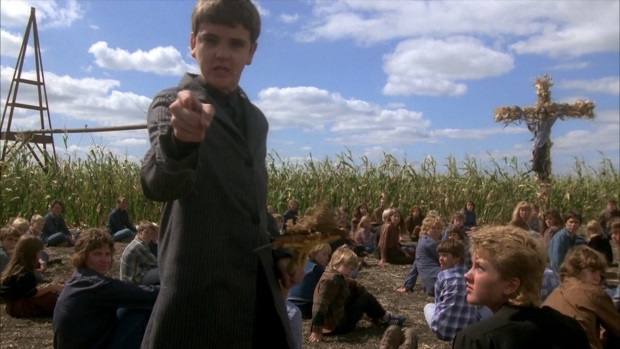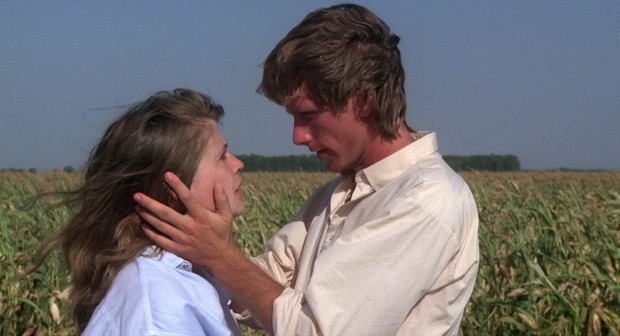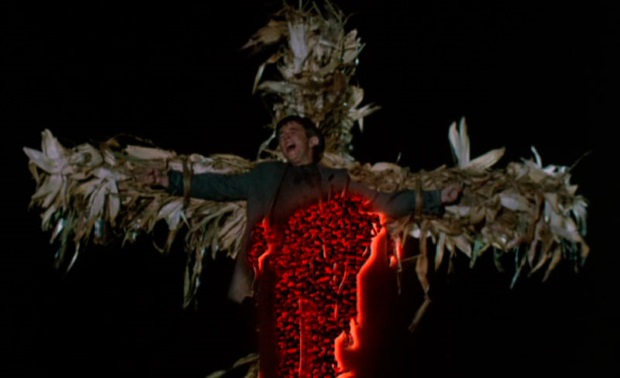Revisiting the film of Stephen King’s Children Of The Corn
Our traipse through the movie adaptations of Stephen King's work arrives at Children Of The Corn...
This article comes from Den of Geek UK.
The film: When Isaac (John Franklin) returns with a group of other children from playing in the cornfields around the town of Gatlin, Nebraska, he leads a revolt that sees the adults slaughtered fast and mercilessly. The only two children who didn’t play in the corn that day, Job (Robby Kiger) and his sister Sarah (Anne Marie McEvoy) remain unhomicidal. Three years later, Vicky (Linda Hamilton) and boyfriend Burt (Peter Horton) are driving near Gatlin when a little boy stumbles in front of their car. He’s had his throat slit and in their quest to get help, the pair find themselves in the midst of Isaac’s not-so-merry band.
After six weeks of consistently good movies, it was only a matter of time before we reached the duffer end of the Stephen King movie spectrum. Children Of The Corn isn’t a travesty by any means, but it is all rather flat, something further emphasised by just how good the likes of Carrie, The Shining, and The Dead Zone in particular are. There are plenty of the usual King hallmarks here and the short story on which Children Of The Corn is based (found in Night Shift) yields a lot of potential for a chilling adaptation, but the big flaw in the adaptation, written by George Goldsmith and directed by Fritz Kiersch, is it never takes advantage of its own concept.
Ghost towns are an inherently creepy thing, a still life portrait of American life with the people that would animate it gone. They’re probably even more creepy if they’re populated by a cult corn deity worshipping children, armed to the teeth and running wild. There is great potential for a chilling story here in which the kids of Children Of The Corn could have become to The Wicker Man what Bugsy Malone is to adult musicals. It’s playing with the same kind of fears; isolation, religious mania, American folk horror, but it is doing it badly. It doesn’t even have The Wicker Man remake’s benefit of unintentional hilarity. Or Nic Cage.

The biggest problem is that Children Of The Corn plays its hand too early by showing us exactly why Gatlin becomes a ghost town. When Burt and Vicky are exploring the empty streets, the dust-covered houses, and the abandoned cafe, it should make you bristle and make your hair stand on end. There should be some kind of trepidation. What are they going to find? How did the town get like this? Why is there corn everywhere? But Children Of The Corn answers all of these questions. In the first five minutes. Any real sense of mystery is swept aside in one scene and the film turns instead to rely upon dramatic irony to build a sense of dread. It doesn’t work.
This is partly because Burt and Vicky, despite capable performances from Horton and Hamilton respectively, don’t really inspire much sympathy. We get one scene with them before their fateful car journey, which establishes that they’ve been together for a while, Burt has just qualified as a doctor, and they’re about to make a trip across country. As the film develops, we’re supposed to care about what might happen to them, about the potential harm that awaits them, but everything to do with their characters carries little weight. They are merely ciphers within the story rather than driving the plot in any way.

The creepy kids fare a little better, particularly John Franklin’s wise-before-his-time Isaac, the boy intoxicated on religious fervour and given direct access to He Who Walks Behind The Rows, the malevolent entity which haunts the cornfields. Courtney Gains’ homicidal Malachi oscillates between a genuine menace and a gawky teenager in a temper tantrum, but he lands most of the more effective moments in the more confrontational scenes. But, as with Burt and Vicky, we are never given enough with these characters to understand them or even really fear them. They just exist because the story needs them to.
It doesn’t help that Job’s folksy narration feels pointless, given a character repeats what he says in dialogue literally after the narration stops, and without context. We know he isn’t narrating the story to anyone in particular because halfway through the film, the narration disappears. It’s almost as if Children Of The Corn suddenly remembers it needs to have some kind of suspense so it stops proffering an explanation, despite having provided most of the crucial information anyway.
When an explanation is required, such as who He Who Walks Behind The Rows is (beyond simply being demonic), the film simply doesn’t offer any. Instead, we get a big red rolling cloud and sentient corn plants. It’s not the stuff of nightmares. The short story itself has a much nastier edge and in turn, a nastier ending. Even in the bloodier moments of the film though, the implication of grisly violence still doesn’t inspire much fear, because the tension is practically non-existent. Admittedly, the opening diner scene, during which Isaac and Malachi make their bid for power by slaughtering all the adults, is well done if perhaps too brief to amplify the shock value. Likewise the car hitting Joseph, but everything that follows that feels toothless in comparison.

Children Of The Corn is a film that consistently signals its wasted potential to you, but without a little crafty, a creepy setting and murderous children does not a good horror film make. How it spawned so many sequels is a mystery to me, but I guess we’ll find out in future how they turn out.
Scariest moment: The initial diner scene, though it an egregious bit of self-spoilering, is probably as chilling as the film gets, particularly that first throat slitting as it feels almost ceremonial in nature.
Musicality: Children Of The Corn was Jonathan Elias’ first full movie score, and boy does he go town on the religious symbolism layered within it. With the choral themes and instruments used, it feels like a fairytale nightmare. It’s the film’s strongest element as a result, bringing a much-needed gusto to the proceedings.
A King thing: Mass religious mania. This pops up a couple of times within King’s work, usually in a small town, such as Gatlin, when it is subjected to something horrible and people struggle to cope with it. Another example is The Mist, in which the zealot Mrs Carmody whips everyone up into a religious frenzy in reaction to the horrors they face.
Join me next time, Constant Reader, to meet a twisted Firestarter…
Follow our Twitter feed for faster news and bad jokes right here. And be our Facebook chum here.
